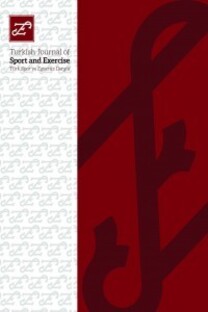A research on mobbing behaviors football trainers face in club environment
Football club; trainer; mobbing.
-
Football club, trainer mobbing,
___
- Agervold M. Bullying at work: a discussion of definitions and prevalence, based on an emprical study. Scandinavian Journal of Psychology, 2007; 48: 161-172. 2. Aktop NG. Anadolu Üniversitesi Öğretim Elemanlarının Duygusal Tacize İlişkin Görüşleri ve Deneyimleri, Yayınlanmamış Yüksek Lisans Tezi, Anadolu Üniversitesi: Sosyal Bilimler Enstitüsü, Eskişehir, 2006.
- Aksoy F. Yıldırmanın (Mobbing) Sağlık Çalışanlarına Etkisi, Doktora Tezi, Marmara Üniversitesi, Sağlık Bilimleri Enstitüsü, İstanbul, 2008.
- Cahppell D. Di Martino V. Violence at work. International Labour Organisation, Geneva, 2006; 70.
- Can Y. A Tipi ve B Tipi Kişilikler Bakımından Mobbing Kişilik İlişkisinin İncelenmesi ve Bir Uygulama, Yüksek Lisans, Kocaeli Üniversitesi, Sosyal bilimler Enstitüsü, Kocaeli, 2007.
- Cemaloğlu N. Okul yöneticilerinin liderlik stilleri ile yıldırma arasındaki ilişki. Hacettepe Üniversitesi Eğitim Fakültesi Dergisi, Ankara, 2007; 33:7-87.
- Cengiz R. Profesyonel Futbol Kulübü Yöneticilerinin Dönüşümsel Liderlik Stilleri İle Kulüplerinin Örgüt Sağlığı ve Futbolcularının Yıldırma (Mobbing) Yaşamaları Arasındaki İlişki, Doktora Tezi, Gazi Üniversitesi, Sağlık Bilimleri Enstitüsü, Ankara, 2008.
- Davenport N, Schwartz RD, Elliott GP. Mobbing, Sistem Yayıncılık, İstanbul, 2003.
- Dikmetaş E, Top M, Ergin G. Asistan hekimlerin tükenmişlik ve mobbing düzeylerinin incelenmesi. Türk Psikiyatri Dergisi, 2011; 22:1-15.
- Ekşici Ş. Kurum ve Kuruluşlarında Psikolojik Taciz (Mobbing) Eylemleri ve Çalışanların Motivasyonu Üzerine etkisi, Yüksek Lisans Tezi, Selçuk Üniversitesi, Sosyal Bilimler Enstitüsü, Konya, 2009.
- Einarsen S, Matthıesen SB, Skogstad A. Bullying, burnout and well-being among assistant nurses. Journal of Occupational Health and Safely - Australia and New Zealand, 1998; 14: 563–568.
- Fettahlıoğlu O. Örgütlerde Yıldırma (Mobbing): Üniversitelerde Üniversitesi, Sosyal Bilimler Enstitüsü, Doktora Tezi, İzmir, 2008. Uygulama, Dokuz Eylül
- Gökçe TA. İş Yerinde Yıldırma: Özel ve Resmi İlköğretim Okulu Öğretmen ve Yöneticileri Üzerinde Bir Araştırma, Doktora. Ankara Üniversitesi, Eğitim Bilimleri Enstitüsü, Ankara, 2006.
- Gülen Ö. The Relationship between Personality and Being Exposed to Workplace Bullying or Mobbing, Yüksek Lisans Tezi, Marmara Üniversitesi, Sosyal Bilimler Enstitüsü, İstanbul, 2008.
- Hubert A. Veldhoven M. Risk sector for undesirable behavior and mobbing. European Journal of Work and Organizational Psychology, 2001; 10: 415-424.
- İyem C. Futbolda mobbing: Sakaryaspor A.Ş. örneği. Sakarya Üniversitesi. XV. Ulusal Yönetim ve Organizasyon Kongresi Bildiriler Kitabı, Sakarya, 2007; 919-938.
- Kaygısız S. Rol Çatışması, Psikolojik İklim ve Mobbing Kavramları Arasındaki İlişkiler: Bir Kamu Hastane İşletmesinde Uygulama, Yüksek Lisans Tezi, Eskişehir Osmangazi Üniversitesi, Sosyal Bilimler Enstitüsü, Eskişehir, 2010.
- Karavardar G. İş Yaşamında Psikolojik Yıldırma ve Psikolojik Özellikleri, Doktora Tezi, İstanbul Üniversitesi, Sosyal Bilimler Enstitüsü, İstanbul, 2009. Gösteren Kişilik 19. Kırel Ç. Örgütlerde Mobbing Yönetiminde Destekleyici ve Risk Azaltıcı Öneriler. Eskişehir: Anadolu Üniversitesi Sosyal Bilimler Dergisi, 2007; 7(2):332–334.
- Koçel T. İşletme Yöneticiliği. 9.Baskı. İstanbul: Beta Basım Yayın, 2001.
- Kök SB. İş yaşamında psiko-şiddet sarmalı olarak yıldırma olgusu ve nedenleri. Erzurum: Atatürk Üniversitesi Organizasyon Kongresi Bildiriler Kitabı, 25-27 Mayıs 14. 2006; 433-448. Ulusal Yönetim ve
- Leymann H. The content and development of mobbing at Organizational http://www. ebscho.com. (17.11.2011). Work
- (5):2,165-184. Psychology, 1996,
- Leymann H, Gustafsson A. Mobbing at work and the development of post traumatic stress disorders. European Journal of Work and Organizational Psychology, 1996; 5, (2): 251- 275, http://www. ebscho.com. (17.11.2011).
- Mikkelsen E, Einarsen S. Relationships Between Exposure To Bullying at Work and Psychological and Psychosomatic Health Complaints: The Role of State Negative Affectivity and Generalized Self-Efficacy. Scandinavian Journal of Psychology, 2002; 43: 397-405.
- Oluremi B. Ayoko, Victor J. Callan, Charmine E.J.Hartel. counterproductive behaviors. Journal of Organizational Analysis, 2003; 11,(4): 283- 301. conflict, bullying, and The International Üniversitesi Örneği, Yüksek Lisans,
- Quine L. Workplace Bullying In Junior Doctors. 2002; 324:878-879. www. bmj. Com, 21.11.2010.
- Parkins IS, “The Influence of Personality on Workplace Bullying and Discrimination”, Journal of Applied Social Psychology, 2006; 36: 2554-2577.
- Pranjic N. Males-Bilic L. Beganlic A. Mustajbegovic J. “Mobbing, Stress, And Work Ability İndex Among Pysicians İn Bosnia And Herzeginova: Survey Study”. Med Lav. Mar-Apr; 2006; 97, (2):160-4.
- Polat O. Pakiş I. Mobbing: işyerinde psikolojik taciz. Acıbadem Üniversitesi Sağlık Bilimleri Dergisi, Ekim 2012; 3: (4), 211-217.
- Tozoğlu E. Farklı Spor Dallarında Görev Alan Antrenörlerin Liderlik Özellikleri ve Bu Özelliklerinin Bazı Değişkenlerle İlişkileri, Yüksek Lisans Tezi. Atatürk Üniversitesi Sosyal Bilimler Enstitüsü, Erzurum, 2003.
- Zapf D. Organizational, work group related and personal causes of mobbing/bullying at work. International Journal of Manpower, 1999; I: 70-85.
- Zapf D, Einarsen S. Bullying in the workplace: recent trends in research and practice- an ıntroduction. European Journal of work and Organizational Psyhology, http://www.ebscho.com.25.12.2011. (10): 4, 369-373.
- Zorel Fİ. Örgüt Sağlığını Tehdit Eden Bir Olgu Olarak Yıldırmanın (Mobbing) Engellenmesinde Örgüt İçi
- Yayın Aralığı: 3
- Başlangıç: 1999
- Yayıncı: Selçuk Üniversitesi, Spor Bilimleri Fakültesi
The analysis of the last shots of the top-level tennis players in open tennis tournaments
İbrahim CAM, Bulut TURHAN, Zeynep ONAG
An analysis on the job satisfactions levels of soccer referees
Meric ERASLAN, İlker OZMUTLU, Murat TEKIN, Selami YUKSEK, Tonguc MUTLU
Haluk KOC, Gökhan ACAR, Mustafa KOC
Gökhan ACAR, Mustafa KOC, Haluk KOC
Ahmet SANIOGLU, Arife ALTIN, Mustafa USLU
Comparison of curiosity levels of physical education teachers to the teachers of other branches
A research on mobbing behaviors football trainers face in club environment
